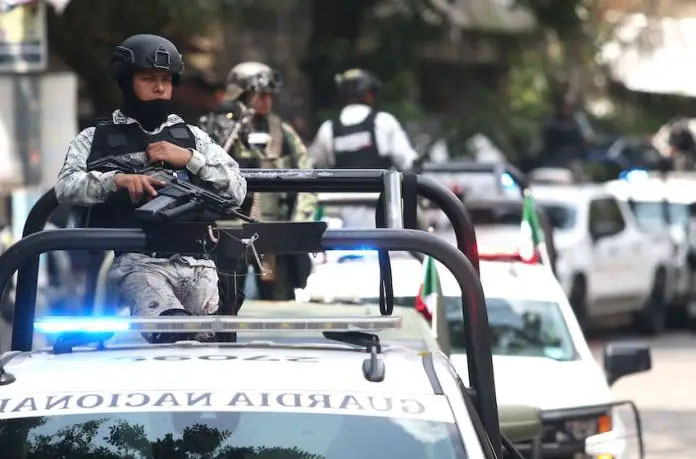by Mexico News Daily
Lawmakers in Mexico’s lower house of Congress approved on Thursday a constitutional reform bill that seeks to place the National Guard (GN) under military control.
The bill will now be considered by the Senate, where the ruling Morena party and its allies are in a strong position to pass the reform proposal.
After a debate that lasted 16 hours, 362 deputies voted in favor of the GN reform proposal while 133 opposed it.
The two-thirds majority required to approve constitutional bills (334 votes) was easily reached.
A supermajority of deputies also approved the bill en lo particular — i.e. after the consideration of its individual articles.
The most controversial aspect of the bill is the provision to place the GN under the control of the National Defense Ministry (Sedena).
However, the bill seeks to modify a total of 12 articles of the Mexican Constitution. Among its aims are to define the GN as a professional public security force that is part of the military but whose members have police training, and to empower it to conduct investigations under the direction of the Federal Attorney General’s Office.
The GN was created by the current federal government as a civilian security force. It effectively replaced the Federal Police, which was disbanded in 2019.
In late 2022, the Congress approved a bill backed by President Andrés Manuel López Obrador that modified four secondary laws and paved the way for the GN to be placed under the control of the army.
However, the Supreme Court ruled in April 2023 that the transfer of control over the National Guard from the civilian Security Ministry to Sedena was unconstitutional, a decision that angered the president.
López Obrador, who argues that the National Guard needs to be under the control of the military to prevent corruption and guarantee the force’s professionalism, subsequently prepared a constitutional bill to once again give Sedena responsibility for the security force his administration created.
Opposition parties, government critics and some human rights organizations pointed to the transfer of control over the National Guard to the army in 2022 as another example of the militarization of Mexico that they say has occurred during the current government. Human Rights Watch has warned that the government’s militarized security policy risks facilitating abuses by security forces while failing to reduce violent crime.
Morena, the Labor Party (PT) and the Ecological Green Party of Mexico (PVEM) have a two-thirds majority in the Chamber of Deputies, allowing them to pass constitutional bills without the support of opposition lawmakers.
The allied parties are just one vote short of a supermajority in the Senate, but it appears likely that they will be able to reach the required threshold to pass the GN reform, as was the case last week with the controversial judicial reform proposal, which is now law.
The National Guard bill could be passed in the Senate as soon as next week, López Obrador’s final full week in office before Claudia Sheinbaum is sworn in as president on Oct. 1.
The GN reform debate in the lower house
Deputy Leonel Godoy, Morena’s deputy leader in the Chamber of Deputies, said that the constitutional bill makes it clear that the National Guard will have “military discipline” but a “police function.”
He stressed that any military personnel who become members of the GN “have the obligation” to first undergo police training.
Morena Deputy Dolores Padierna Luna asserted that the reform proposal will lead to the “rebirth of the National Guard as an institution of military origin,” while PT Deputy Pedro Vázquez said that the bill will enable the security force to pacify the country.
Opposition lawmakers argued that the transfer of responsibility for the GN to Sedena would only increase the militarization of Mexico.
National Action Party (PAN) Deputy Germán Martínez Cázares railed against President López Obrador, who has relied heavily on the military, using it for public security, infrastructure construction and a wide range of other tasks.
“No to militarization,” he said, adding that López Obrador has failed to bring peace to Mexico “as he promised.”
Martínez pointed out that there have been more murders during the current six-year term of government than during the presidencies of Enrique Peña Nieto (2012-18) and Felipe Calderón (2006-12).
López Obrador’s presidency has been “a six-year period of death, a six-year period of blood and a six-year period of militarization,” he said.
PAN Deputies Agustín Rodríguez and Miguel Ángel Monraz, and other opposition deputies, questioned why Morena lawmakers supported the militarization of public security now when they previously opposed it.
Before becoming president, López Obrador himself was opposed to the use of the armed forces for public security tasks.
“What a short memory [they have]” said Monraz.
Citizens Movement (MC) party deputies unfurled a giant banner in the Chamber of Deputies that read: “Mexico with justice and peace. No to militarization.”
They also placed signs on their seats that read: “We want peace, not militarization.”
With reports from El Financiero, Milenio, La Jornada and Reforma.



